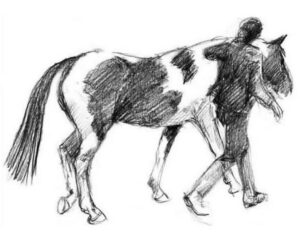Felicity George BSc MPhil SEBC PTC
Equine Behaviourist

What is a ‘Behaviour Problem’?
If your horse’s behaviour is concerning you for any reason, spending time with your horse can become stressful, upsetting or even dangerous and we can class the behaviour that is worrying you as a ‘behaviour problem’. Clearly, people’s attitudes about what is or is not a problem vary widely, from those who are concerned by small signs of tension in their horse to those who happily report that they had a good week and only got bucked off three times! The term ‘behaviour problem’ does not put any blame on your horse (or you!) it simply means that you have a concern about how he is behaving.
So, whether your horse’s behaviour is, for example:
- causing you concerns for your safety, or the safety of others
- causing you worry about his welfare
- causing you worry due to complaints about his behaviour from livery staff or other owners at your yard
- preventing you from performing routine tasks such as clipping
- detracting from your competitive success or progress in training
- simply puzzling you because you don’t understand his behaviour
a qualified equine behaviour consultant can help you to understand the behaviour and resolve any problems.
Examples of typical behaviour problems
Including problems tacking up, mounting, bucking, rearing, bolting, napping, jumping problems, rushing backwards, head tossing, spooking, lack of attention to rider/slow to respond to aids, problems when away from home, for example ‘playing up’ when out at competitions.

Solving Behaviour Problems
If your horse had a physical problem that was concerning you, you would, in the first instance, call your vet. We know that vets are trained to a certain standard, and should carry out a professional diagnosis of the problem then recommend appropriate treatment.
Likewise, if your horse has a behaviour problem, whether it is a ridden problem, management or handling issues, or anything else that is concerning you, it is advisable to get help from someone who is properly qualified in this area.
Other approaches, such as taking advice (often unasked for!) from someone who has seen a ‘similar’ problem, or embarking on a lengthy retraining programme without a clear idea of why it might fix the problem can be time-consuming and may make the problem worse instead of better. ‘Experimenting’ in this way can also be a big risk to your safety and the welfare of your horse.

